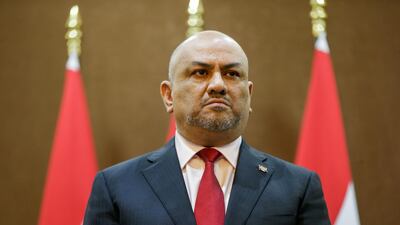Yemeni Foreign Minister Khaled Al Yamani's sudden resignation was due to a number of "differences" in government that prevented him from fulfilling his duties, officials close to the minister told The National.
The country’s top diplomat, who took over the post in May 2018, submitted his notice letter on Sunday to President Abdrabu Mansur Hadi, but did not publicly announce his reasons.
Mr Al Yamani is a professional diplomat, who tried to achieve a number of goals as a foreign minister, a Yemeni official, who remained anonymous because he is not authorised to brief the media, told The National.
“When he felt he can’t and that the situation won’t allow it, he decided to give space to someone else,” the official said.
Before assuming office in the foreign ministry, Mr Al Yamani served as Yemen’s permanent delegate at the United Nations.
Reports surfaced that Mr Al Yamani was about to be dismissed from his position but the Yemeni official denied the news.
In order for Mr Al Yamani to officially confirm his departure, he needs to get the approval of Mr Hadi, which he is yet to give.
The fact that Mr Hadi has waited so long to accept the resignation suggests either he did not know it was coming or that he does not have a suitable replacement in mind, Elana DeLozier, a research fellow at the Washington Institute for Near East Polic, told The National.
“He may struggle to find a stellar replacement given that many professional and experienced Yemeni diplomats wish to remain ‘above the fray’ and out of the war,” Ms DeLozier said.
Ahmed bin Mubarak, Yemen's ambassador to Washington, and former foreign minister Abu Bakr Al Qirbi are among the candidates favoured to succeed Mr Al Yamani, local media said.
Mr Hadi may draw from “the pool of diplomats already working for his administration, but many of them occupy critical positions that would then need filled,” Ms DeLozier said.
Will his departure impact Yemen’s peace process?
Any kind of diplomatic change is likely to have at least a temporary destabilising effect, Ms DeLozier said.
“The Stockholm Agreement and other initiatives between the parties in the Yemen war are particularly fragile right now,” she said.
Mr Al Yamani led the government’s delegation during UN-led peace talks in Geneva and Sweden last year.
The talks provided a glimmer of hope as all sides appeared to be more positive than in September's round of talks in Geneva, which failed to bring the Houthis to the table.
Negotiations in the Swedish village of Rimbo produced agreements on a prisoner exchange, the ceasefire in Hodeidah, which is the main entry point for desperately needed food and aid, and for talks on a ceasefire in Taez.
As for the impact of the minister's departure on the peace process, it entirely depends on who replaces him as foreign minister, Ms DeLozier said.
“Publicly, Mr Al Yamani was in line with the rest of the Hadi government, regularly accusing the Houthis of procrastination and calling for the Special Envoy to denounce perceived Houthi non-compliance,” she said.
But, privately, he may have had views that ran contrary to the preferred strategy, the expert said.
The subject of peace is controlled by many internal and external factors, Hooria Mashhour, former Yemeni human rights minister told The National.
“The first is the willingness and sincerity of the parties involved in dealing with ending the endless cycle of violence,” Ms Mashhour said.
“I think that the international community have become more aware of the nature of the problem in Yemen and its implications for security and peace in the region and even in the world,” the former minister said.
Peace is not impossible to achieve if all the Yemeni parties “would realise what the conflict has done to their homeland and to their people,” she said.


